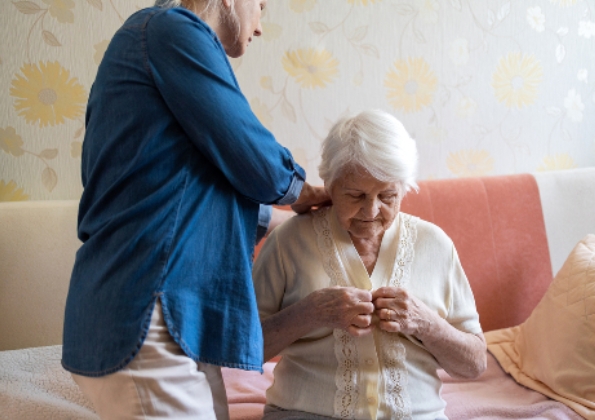Debating whether or not you should move your elderly parent into an assisted living facility? It’s a big decision, and not one to be taken lightly. If you need help deciding if now is the time to make the move, here are eight signs that your elderly loved one might benefit from assisted living:
1. Your loved one needs around-the-clock care
This is perhaps the most obvious reason to move your loved one into assisted living. Whether their health problems are physical, mental or both, some elderly adults need around-the-clock care, and that can be hard to achieve either by yourself or with private in-home help.
You have to sleep sometime, and hiring a full-time nurse for the night shift can be expensive. In that case, it often makes more sense to move your loved one into a facility where they will have 24/7 care tailored to their needs. That way, someone will always be awake and on call whenever your loved one might need them.
If you are considering assisted living for your loved one, it’s important to research and compare facilities to find the best fit for their needs. You can find assisted living facilities in the US here, and use search filters to narrow down your options based on location, services, and amenities. With careful research and consideration, you can find a facility that provides your loved one with the support and care they need to thrive.
A good option would be to use Storiicare’s Assisted Living Software.
2. They are becoming increasingly agitated or aggressive
Unfortunately, people suffering from dementia can become agitated or even aggressive, especially as the disease progresses. One common behavior is called “sundowning,” which refers to people with dementia becoming more agitated at the end of the day after they have used up all their mental energy.
Some individuals with more progressive dementia may go so far as to become verbally or even physically abusive, and this can be tough to handle at home on your own. Moving them into an assisted living facility with professional staff trained to handle these sorts of outbursts may be the best decision for both of you.
3. They constantly wander off
Another common side effect of aging can be the tendency to wander off, and it can be very distressing when your loved one disappears. Regular houses are not designed to keep patients with dementia from letting themselves out and walking into the road or another potentially dangerous situation.
If your loved one constantly disappears, or forgets where they are going halfway there (an early sign of dementia), then it might be time to move them into a living facility where they won’t be able to wander off as easily.
4. They have experienced recent falls or other mobility issues
Older adults are much more prone to tripping and falling hazards, and they are also more likely to sustain serious injury from them due to age-related bone and muscle loss. If your loved one has recently fallen — or you’re concerned that they might fall and be unable to call for help — then an assisted living facility can help put your worries to rest. Not only is there always staff around, most facilities are also designed to minimize common trip-and-fall hazards, making the environment safer as well.

By pikselstock / Shutterstock.com
5. They can’t keep up with daily activities
As people get older, they sometimes struggle to cope with important activities, such as paying the bills or running errands. As they age, they may decline further, until they struggle with even basic tasks such as bathing, getting dressed and feeding themselves. While some solutions such as adaptive clothing or adult bibs can help them live independently for longer, sometimes, it’s not enough. Watch for signs of decline, such as unpaid bill notices stacking up or wearing the same clothes over and over again. If your loved one is unable to care for themselves, they will need some sort of assistance, whether that’s you, a family member, a home health aide or an assisted living facility.
6. They forget to take their medication
One of the most important daily habits for older people is taking their medications on a regular schedule. As people age, most of them have to take at least one kind of medication in order to keep their various health issues in order and have the best quality of life possible. If your loved one keeps forgetting to take their medication, that can have serious ramifications for their physical and mental health, and even potentially shorten their lifespan. If your elderly loved one has been falling down on the medication front, then it might be time to consider putting them in assisted living.
7. They feel isolated and sad
Older adults often find it difficult to leave the house, which can make it hard for them to socialize if people don’t come to them. This can leave them essentially feeling like shut-ins, isolated and alone, which can cause their mental health (and later their physical health) to spiral downwards. If your loved one struggles to make it to social events, moving them into an assisted living facility can provide them with the social interactions they need, in addition to the medical care. Most senior assisted living facilities put on a variety of activities for residents — everything from swing dancing to bingo tournaments — to help residents feel less isolated.
8. You are burned out by caregiving stress
Maybe you’ve been caring for your elderly loved one on your own this whole time, and you’re beginning to feel the stress getting to you. Caregiver burnout is quite common, especially if you are balancing caregiving for a senior with a full-time job, raising children or other responsibilities. If you are feeling depressed, anxious, stressed out or exhausted in regards to your caregiving responsibilities, it might be time to look into an assisted living facility, or at least hiring a part-time home health aide to take some of the burden off you. You don’t have to go it alone!
Moving your elderly parent into assisted living might be the best choice for both of you. Use this checklist of eight signs to decide whether or not it’s time to consider moving your loved one into assisted living.








